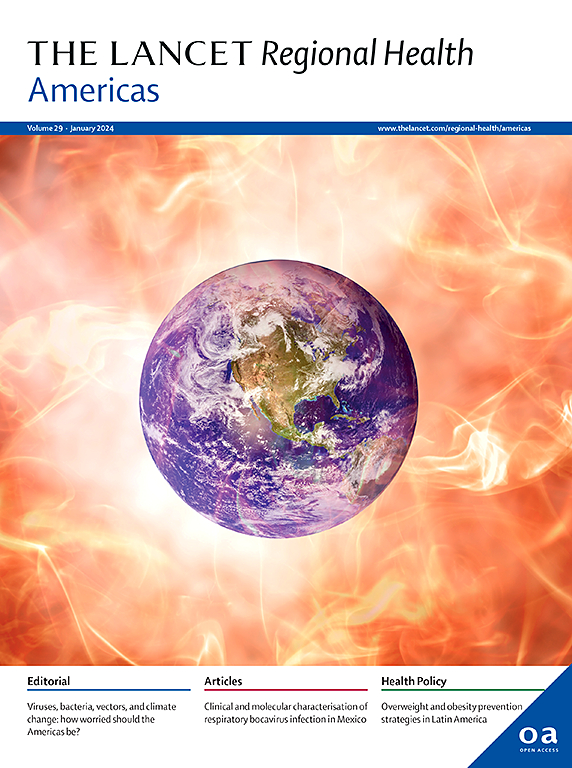Regional and national estimates of children affected by all-cause and COVID-19-associated orphanhood and caregiver death in Brazil, by age and family circumstance: a modeling study
IF 7
Q1 HEALTH CARE SCIENCES & SERVICES
引用次数: 0
Abstract
Background
Orphanhood and caregiver death can have severe consequences for children. Timely and accurate data can guide policy, particularly during health crises like COVID-19. The aim of our study is to present national and subnational analysis of both all-cause and COVID-19-associated orphanhood and caregiver death in Brazil and compare our model outputs with bespoke administrative datasets.
Methods
We use publicly available national datasets to estimate the number of Brazilian children experiencing parent and caregiver loss due to all causes and COVID-19 in 2020–2021.
Findings
An estimated 1,300,000 (95% uncertainty interval, 1,190,000, 1,430,000) children in Brazil experienced loss of one or multiple parents and/or co-residing caregivers. 673,000 (652,000, 690,000) were estimated to have lost one or both parents, of which 149,000 (144,000, 154,000) were COVID-19 associated; 635,000 (534,000, 758,000) children were estimated to have lost a co-residing grandparent or other kin, of which 135,000 (85,900, 199,000) were COVID-19 associated. Orphanhood varied substantially across states, with the rate of all cause parental orphanhood highest in Roraima at 17.5 (15.6, 20.6) per 1000 children and the lowest in Santa Catarina at 9.5 (8.7, 10.4) per 1000 children. COVID-19-associated orphanhood was also unevenly distributed, with Mato Grosso experiencing the greatest rate, at 4.4 (3.9, 5.3) per 1000 children, while Pará experienced the lowest rate of 1.4 (1.2, 1.8) per 1000 children. Comparisons with limited data from Brazil’s civil registry offices and (manually reviewed death certificates in Campinas found a similar demographic distribution of orphanhood. However, our estimates suggested that administrative sources undercount orphanhood.
Interpretation
Our findings highlight the extent of orphanhood in Brazil and large inequalities between states. Comparisons between administrative data and model estimates show similar temporal patterns and proportions of maternal and paternal orphanhood but different magnitudes. This suggests that strengthening vital registration systems can put children at the center of public health responses globally.
Funding
This study was funded by “Building Global Public Health Capacity to Link Real-Time Modelling Data on COVID-19-associated Orphanhood and Caregiver Deaths to Inform Prevention, Preparedness and Protection from COVID-19 consequences” (2023 CDC/WHO grant) and the Moderna Charitable Foundation.
按年龄和家庭环境分列的巴西受全因和与covid -19相关的孤儿和照顾者死亡影响的儿童的区域和国家估计数:一项模型研究
孤儿和照顾者的死亡会给儿童带来严重的后果。及时和准确的数据可以指导政策,特别是在COVID-19等卫生危机期间。我们研究的目的是对巴西全因和与covid -19相关的孤儿和照顾者死亡进行国家和地方分析,并将我们的模型输出与定制的行政数据集进行比较。方法我们使用公开的国家数据集来估计2020-2021年因各种原因和COVID-19而失去父母和照顾者的巴西儿童人数。发现san估计有130万(95%不确定区间,119万,143万)巴西儿童失去了一个或多个父母和/或共同居住的照顾者。估计有67.3万人(65.2万人,69万人)失去了父母一方或双方,其中14.9万人(14.4万人,15.4万人)与COVID-19相关;据估计,63.5万(53.4万,75.8万)名儿童失去了共同居住的祖父母或其他亲属,其中13.5万(8.59万,19.9万)名儿童与COVID-19有关。各州的孤儿率差异很大,罗赖马州的全因父母孤儿率最高,为每1000名儿童17.5(15.6,20.6),圣卡塔琳娜州最低,为每1000名儿童9.5(8.7,10.4)。与covid -19相关的孤儿分布也不均匀,马托格罗索州的孤儿率最高,为每1000名儿童4.4(3.9,5.3),而帕尔州的孤儿率最低,为每1000名儿童1.4(1.2,1.8)。与巴西民事登记办公室的有限数据和坎皮纳斯手工审查的死亡证明进行比较,发现了类似的孤儿人口分布。然而,我们的估计表明,行政来源低估了孤儿人数。我们的研究结果突出了巴西的孤儿程度和各州之间的巨大不平等。对行政数据和模式估计的比较表明,双亲孤儿的时间模式和比例相似,但程度不同。这表明,加强生命登记系统可以将儿童置于全球公共卫生应对的中心。本研究由“建设全球公共卫生能力,将与COVID-19相关的孤儿院和照顾者死亡的实时建模数据联系起来,为预防、准备和保护COVID-19后果提供信息”(2023年疾病预防控制中心/世卫组织资助)和现代慈善基金会资助。
本文章由计算机程序翻译,如有差异,请以英文原文为准。
求助全文
约1分钟内获得全文
求助全文
来源期刊

Lancet Regional Health-Americas
Multiple-
CiteScore
8.00
自引率
0.00%
发文量
0
期刊介绍:
The Lancet Regional Health – Americas, an open-access journal, contributes to The Lancet's global initiative by focusing on health-care quality and access in the Americas. It aims to advance clinical practice and health policy in the region, promoting better health outcomes. The journal publishes high-quality original research advocating change or shedding light on clinical practice and health policy. It welcomes submissions on various regional health topics, including infectious diseases, non-communicable diseases, child and adolescent health, maternal and reproductive health, emergency care, health policy, and health equity.
 求助内容:
求助内容: 应助结果提醒方式:
应助结果提醒方式:


